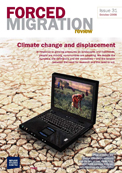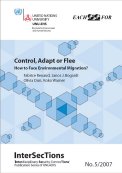 Oxfam International has just published a new report called ‘The Right to Survive: The humanitarian challenge for the twenty-first century’. According to the report, current research shows that in a typical year, almost 250 million people around the world are affected by climate-related disasters. This alarming number could grow by 54% to an average of more than 375 million people over the next six years, threatening to overwhelm the world’s ability to respond.
Oxfam International has just published a new report called ‘The Right to Survive: The humanitarian challenge for the twenty-first century’. According to the report, current research shows that in a typical year, almost 250 million people around the world are affected by climate-related disasters. This alarming number could grow by 54% to an average of more than 375 million people over the next six years, threatening to overwhelm the world’s ability to respond.
The report also shows that, “In the next few decades, increasing and shifting populations and climate change will exacerbate existing problems such as conflict, food shortages, and land dispossession”. This will lead to a significant growth in the numbers of those forced to leave their homes in search of safer areas.
It calls on the international community to act swiftly to re-engineer the way it responds to, prepares for, and prevents disasters to save lives. Oxfam stresses that the “humanitarian challenge of the twenty-first century demands a step-change in the quantity and nature of humanitarian response. Whether or not there is sufficient will to do this will be one of the defining features of our age – and will dictate whether millions live or die”.




I strongly agree with this report when it says international humanitarian agencies pay scant regard to working with national or local governments. These two bodies need to work together to save lives and mitigate impending disasters. However, what about cases like Burma though when assistance is blocked and people suffer? Should the agencies have the right to intervene and still go in regardless?
Interesting tidbit from the report:
“Following the 1972 super cyclone that killed a quarter of a million people, Bangladesh invested heavily in prevention and protection measures. The death toll from super cyclones in Bangladesh is in the low thousands – still far too high, but much less devastating.”
Andy check out this link for the “Responsibility to Protect” (R2P) concept which is fairly new in International Relations
http://www.responsibilitytoprotect.org/